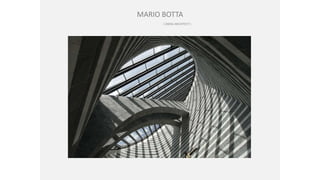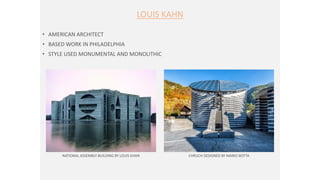Mario botta (2)
- 1. MARIO BOTTA ( SWISS ARCHITECT )
- 2. Early Childhood • Mario Botta was born on 1 April, 1943 in Mendrisio, Ticino, Switzerland. • He attended the primary school in Genestrerio and Liceo Artistico (High School) in Milan. • As a child, the mountains was the world for him, the peaks, the Alps, the entire universe. • He climbed up the mountains early morning to see the sunrise. • He back then felt that mountains let him see the world. • Being born in Ticino in the Mediterranean and Central Europe, there happened intersection of many different cultural practices, this particular environment created a sense of an eclectic spirit in Botta’s mind. https://youtu.be/_hFV29SorBw
- 3. ADOLESCENCE HOBBIES, EXPERIENCES, INFLUENCES • From a very early age botta wanted to work with images. It was clear that he would become either an artist, photographer, or architect. There was an opportunity to work as an apprentice at an architect’s office in lugano when he was just 15. So, he started working even before he went to school to study architecture. • Botta’s work is deeply influenced by these three architects. • Le Corbusier : Corbusier has transformed life’s problems in architecture – social aspects, urban strategies, mass construction, and so on. He expressed them in new and transformative ways. Louis Kahn : Kahn was more concerned with the origins of life. His work was about transforming nature and culture. Carlo scarpa : Scarpa had a very acute sensibility for expressing materials. He was perhaps the most able master who could emphasize the richness and brilliance of materials. https://www.archdaily.com/964065/architecture-stands-out-because-it-has-something-to-say-to-its- context-in-conversation-with-mario-botta?ad_source=search&ad_medium=search_result_articles
- 4. Le Corbusier • SWISS FRENCH ARCHITECT • DESIGNER • PAINTER • URBAN PLANNER • FIVE POINT OF ARCHITECTURE BUILDING STRUCTURE DESIGNED BY LE CORBUSIER MUSEUM DESIGNED BY MARIO BOTTA
- 5. LOUIS KAHN • AMERICAN ARCHITECT • BASED WORK IN PHILADELPHIA • STYLE USED MONUMENTAL AND MONOLITHIC NATIONAL ASSEMBLY BUILDING BY LOUIS KHAN CHRUCH DESIGNED BY MARIO BOTTA
- 6. Carlo scarpa • ITALIAN ARCHITECT • GALLERIE DELL’ACCADEMIA INTERIOR OF GALLERIE DELL ACCADEMICA INTERIOR PETRA WINERY DESIGNED BY MARIO BOTTA
- 7. EDUCATION AND APPRENTICESHIP • Educational timeline • 1949 – 1958 primary and secondary schools in genestrerio and mendrisio • 1958 – 1961 draughtsman apprenticeship at carloni and camenisch architects in lugano • 1961 – 1964 art college in Milan • 1964 – 1969 studi all’lstituto universitario di architectural IUAV a venezia • 1965 practical work in the atelier of le Corbusier in Venice • 1969 Encounter and collaboration with Louis I. Kahn in Venice. Degree at the IUAV, Venice; his supervisors were Carlo Scarpa and Giuseppe Mazzariol. • Education • Mario botta first attended the art college in Milan and then studied at the university institute of architecture in Venice. Directed by Carlo scarpa and Giuseppe mazzariol he received his professional degree in 1969. • while studying in Venice, he had the opportunity to meet and work for le Corbusier and Louis i. Kahn. http://www.botta.ch/en/studio
- 8. PHILOSOPHY • Importance of the site • The city and the historical stratification • Light • Gravity • Geometry, symmetry, order • Natural materials • The territory of memory, respect of the great past • Ethical meaning of architecture http://www.botta.ch/en/PRINCIPI
- 9. IMPORTANCE OF THE SITE • Every work of architecture entails the construction of a site. It is not an isolated object; on the contrary it is an entity that takes root in a distinctive place. For this reason the territory is an integral part of the project, and never an incidental element. From this point of view, it can be said that architecture is the discipline that, instead of building on a site, builds that site. CHAPEL OF MOUNT TAMARO, SWITZERLAND THE FIORE DI PIETRA RESTRAURANT, SWITZERLAND
- 10. THE CITY AND THE HISTORICAL STRATIFICATION • The city (in particular the European one) is an extraordinary model of aggregation; it is the highest expression of social life. Its millenary stratification makes it a bulwark of quality compared with the anonymity brought about by the globalization. MART MUSEUM OF MODERN AND CONTEMPORARY ART OF TRENTO AND ROVERETO, ITALY
- 11. LIGHT • Light generates space. It gives emphasis and rhythm, it marks the spaces and bestows balance to the structure: neither space nor architecture could be perceived without light. Light completes the architectural project, so it is necessary to determine from the very first planning stages the distinctive features that will make it the fundamental element for the understanding and the use of the constructed work. SAN GIOVANNI BATTISTA MOGNO SWITZERLAND
- 12. GEOMETRY, SYMMETRY, ORDER • Preference for the simple and primary forms combined to achieve symmetrical order. Geometry allows to control the balance of the spaces thus making them recognizable and understandable. San Francisco Museum of Modern Art
- 13. NATURAL MATERIALS • Natural materials are characterized by strength and durability. They also have a great ductility, i.e. the capacity to modify in time and space their aspect, their structure and, as a consequence, their appearance. CYMBALISTA SYNAGOGUE AND JEWISH HERITAGE CENTER, ISRAEL
- 14. THE TERRITORY OF MEMORY, RESPECT OF THE GREAT PAST • To promote a different, more sustainable relationship with the environment, it is necessary to emphasize the importance of the territory of memory, whose value is proportional to the value we assign to the past. To give importance to memory compels us to update, hence to get possession of, the great ideas of the past. • Inspired by traditional houses in Venice or Florence with thick walls, high ceiling, and small windows. EVRY CATHEDRAL, FRANCE
- 15. ETHICAL MEANING OF ARCHITECTURE • Architecture should have an ethical rather than an aesthetical meaning. The aim of the architectural fact is that of offering good quality living values opposed to merely aesthetical images. The search for a better quality of life goes through the search for a better space for life. A action that transforms a condition of nature into a condition of culture. CHIESA DI SAN ROCCO, SAMBUCETO, ITALY
- 16. DESIGN ASPECTS • Modernism • Symbolism • Regionalism • Culture • Light • Vernacular material • Diagonal axis • Spaces of poetry • Geometry • Revive an old transformation • Topography • Social environment Source: slideshare
- 17. ARCHITECTURAL LANGUAGE • Classical symmetrical layout • Simple geometric shape • Closed and thick walls • Skylight • They use geometry of plan into the section PLAN TO SECTION
- 18. QUOTES • “For me, architecture is not just creating a space to protect people but to make them dream as well.” • “ The architect works in the territory of memory” • “There is great mystery in a church. For me, there is a great privilege to be confronted with the design of a church because it shelters the most powerful themes of humanity: birth, marriage, death.” • “ A museum is a spiritual place. People lower their voices when they get close to art.” • “L'architecture transforme un état de nature, en état de culture. (Architecture transforms a state of nature into a state of culture) https://www.brainyquote.com/authors/mario-botta-quotes Mario Botta

















